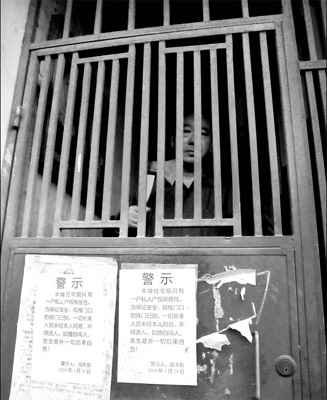Society
Shanghai residents fight forced demolitions
By Qian Yanfeng (China Daily)
Updated: 2010-02-26 07:47
 |
Large Medium Small |
Shanghai govt needs profits from land deals, experts say
SHANGHAI: Cheng Laifa has locked himself up in his apartment for more than 10 days, blocking all the windows with bricks and planks, and surviving on instant noodles.
 Cheng Laifa stands behind the iron door of his apartment. The notices posted on the door read: "This is a private apartment. The door is now locked for the sake of security. No one can come through this door without my permission." [Qian Yanfeng] |
Cheng, 55, said his self-imposed imprisonment is the only way to protect his home from being forcibly demolished.
Cheng is protesting against the large-scale old neighborhood regeneration projects going full steam in the city. Local authorities introduced new policies in 2008 which stipulate that relocation projects can proceed only when 90 percent of the residents affected agree to relocate and more than two-thirds approve the compensation plan.
However, disputes and disgruntled protesters continue to make headlines in the city, where millions of residents have to make way for urban development each year.
According to a recent administrative ruling issued by the Yangpu district government, Cheng's apartment was slated for demolition before the Spring Festival to make way for a new high-end business and residential area.
| ||||
"The land is claimed by the government and then sold to developers," he said. "There are deals behind this. How can we expect the government to be its own judge and make fair decisions?"
In China, where forced relocation by the government is considered legitimate according to the existing law, many people like Cheng have resorted to extreme measures to protect their property rights.
Pan Rong, from the Minhang district in Shanghai, threw self-made gasoline bombs at a demolition crew to protest the forced demolition of her house in June last year. She and her husband were later seized, their house was still torn down and her husband was imprisoned for eight months.
A new draft regulation amendment on the demolition of urban housing is under public review. However, the government is still authorized to force demolitions after paying the homeowner compensation, even if the owner disagrees with the amount.
"Although the current legal system allows the government to force relocations, it is not reasonable and needs a major reform. The court, not the government, should decide the legitimacy of home demolition decisions," said a Shanghai-based lawyer surnamed Xu.
The government might be lured to accelerate house demolitions given the huge profits involved in land sales, which contribute heavily to local revenue, he said.
Shanghai completed more than 1 million square meters of relocation projects last year, up from 610,000 sq m in 2008 and 650,000 sq m in 2006, according to Zhao Dehe from Shanghai's Urban Construction and Communications Commission, which oversees the city's old neighborhood regeneration projects.
Statistics from the China Index Academy, a domestic real estate research institute, showed that land transfer fees last year in Shanghai exceeded 100 billion yuan ($14 billion) , the second highest in all Chinese cities.
"The government should make sure the revenue earned from land transfers brings real benefits to the residents, since they have made great sacrifices by moving out of their houses," Xu said.
"We also need to take into consideration that the government needs that money given the scale of urban construction now under way in the city, soon to hold the World Expo. Under the current tax system, in which most of the local tax revenue has been turned over to the central government, it is natural for the local authorities to seek profits from land deals," he added.
But Bo Haibao, director of the School of Politics and Law at Shanghai Finance University, said the root cause of all relocation disputes stems from the fact that property prices in major Chinese cities have grown beyond the reach of most residents.
"To be fair, the government has already raised, to a large extent, compensation standards for homeowners. Compensation cannot be arbitrary and must be based on market valuation.
"In order to bridge the gap between the current compensation standards and residents' expectations, the government must try to cool down the real estate market so that people will be able to buy themselves an apartment with the money they receive," he said.











